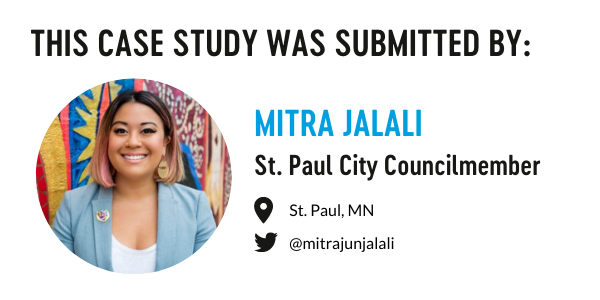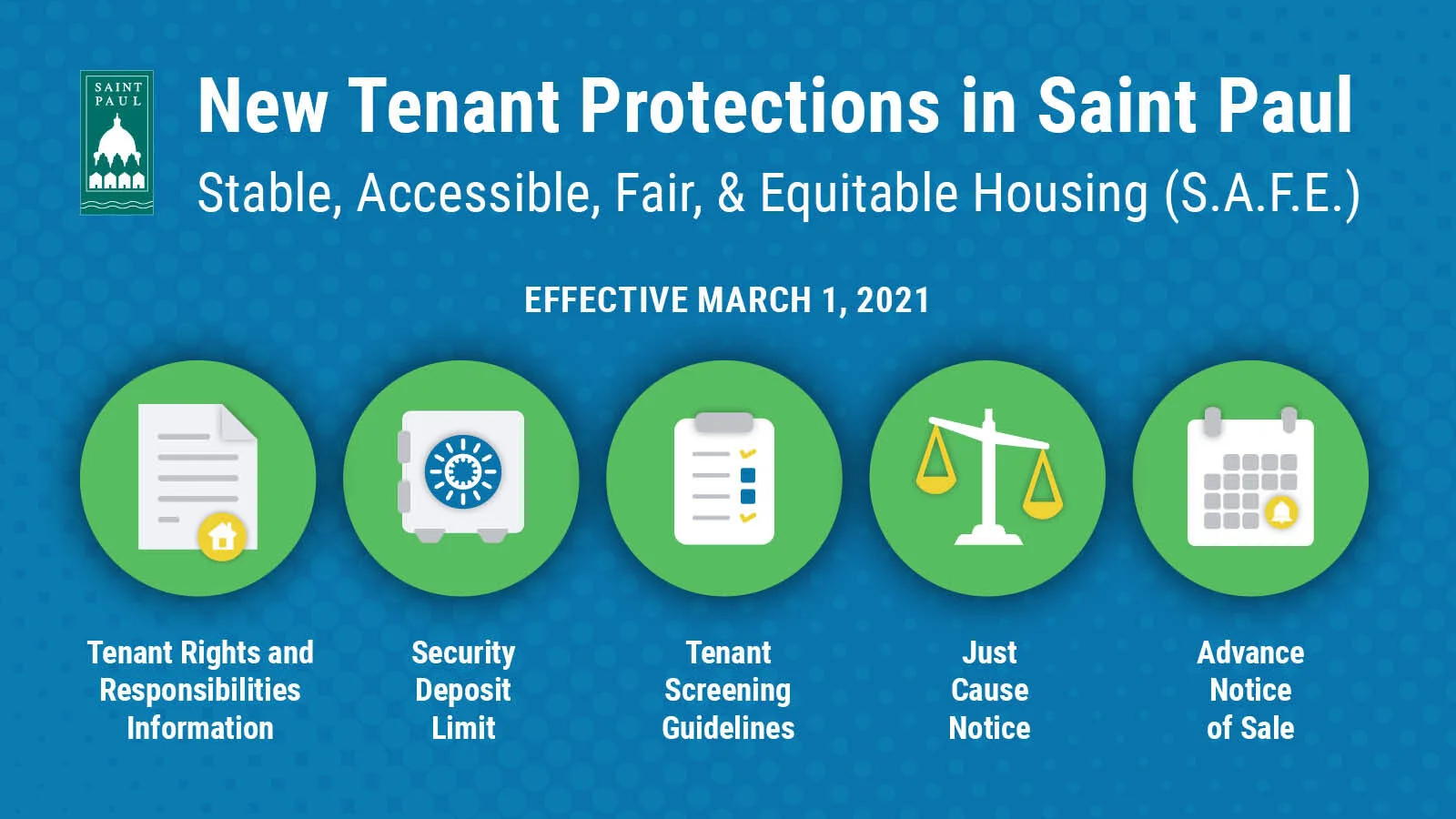Renter Protection Package
St. Paul, MN
Population: 100,000-500,000 | Government type: City | Topic: Housing
The policy
In the spring of 2020, St. Paul passed a groundbreaking tenant protection package. The policies, which go into effect on March 1, 2021, include just cause policies that specify reasons why a landlord may evict a tenant, a security deposit limit, tenant screening guidelines, tenant rights and responsibilities information, and advance notice of sale. Arriving at this outcome involved a multi-year process with institutional direction, topic direction, research, and an actual legislative battle.
Renters in St. Paul faced several significant challenges to securing safe and adequate housing. First, many renters do not know their rights due to a lack of user-friendly guidance at the state level. Second, many faced discrimination in accessing housing, in part due to the screening criteria or security deposit requirements. The city also struggled to preserve naturally occurring affordable housing (NOAH), particularly multi-family buildings that immigrant and low-income residents and families depend on. Finally, Minnesota has relatively weak protections for renters, leaving cities to create whatever protections they can locally.
In 2017, as a result of years of community organizing, the council and mayor assembled a fair housing workgroup and recommended tenant protections as one of several key priorities. The following year, the council issued a staff directive to research prospective policy ideas for further consideration and launched an extensive community engagement process to inform the drafting of the ordinance in 2019. Finally, in the late spring of 2020 (delayed due to Covid-19), the ordinance passed the council with a unanimous vote.
St. Paul’s five central policies address each of the challenges noted above. The publication of tenant rights and responsibilities information ensures that both tenants and landlords know the law and have access to resources. The city will publish the information online in a packet with multiple languages for easier and more inclusive access. Minneapolis implemented reforms to their screening criteria process in 2018 with the cooperation of an inter-city working group; St. Paul passed similar screening reforms involving the criminal, rental history reporting, and security deposit cap.
The advance notice of sale helps give residents in NOAH housing units a 90 day notice period if their landlord plans to sell the property. This will include all NOAH units from single-family homes to high rises and allows time for tenants, the city, and preservation buyers to step in to purchase and preserve affordable housing. Advance notice also establishes a 90-day protection period following the sale for tenants to stay in place. If that is not feasible, the landlord must provide relocation assistance, calculated at three months rent provided by the seller and factored into the building sale price.
The just cause notice was the most controversial policy. The city does not have authority over state processes around eviction, so they crafted the policy to regulate informal evictions (e.g. one-month or month-to-month leases). In many instances, particularly when the pandemic hit, landlords started non-renewing residents, especially those not able to keep up with their payments. Renters, who are generally lower-income, have lower wealth, are more often women of color with families, and live in more precarious situations, are often subject to non-renewals of this kind, often for retaliatory measures such as occasional noise level complaints.
Functionally, the non-renewals are different from a formal eviction. St. Paul’s Just-cause provision specifies ten legal just causes for non-renewals. Landlords must provide a legitimate reason when they stop renewing resident leases and they must provide tenants written notice of the cause. Tenants can use this information to appeal against any potential discrimination. The new suite of tenant protection policies ranges from macro to micro, ensuring tenants get certain rights to which they are entitled from the moment they file an application to after they’ve settled into their home.
Collaborative Governance
Community organizing focused on protecting renters started 10 years ago and continued more recently as a group of organizations formed as a coalition called Housing Equity Now St. Paul (HENS). Together they worked with tenants to identify the top causes of discriminatory access to housing and housing instability. Understanding community needs helped garner support from the city and resulted in policies that addressed a range of tenant issues. The advocates pushed for advanced notice of sale, which laid the groundwork for tenant and community opportunity to purchase.
A significant turning point during the city negotiations occurred when George Floyd was murdered by the Minneapolis Police Department. The national uprising for freedom from violence and police brutality threw the process into a new light. As renters—particularly BIPOC renters—struggled with the disproportionate impacts of the pandemic, violence at the hands of the state, and potential houselessness, the need to increase protections for the most vulnerable became glaringly evident.
Despite attempts to water down the legislation, in the final chapter, the community was unrelenting and successful, in their argument that this was a racial justice imperative; the council passed the full package of policies on a 7–0 vote.
Emphasis on equity
At its core, this is a fair housing policy. It seeks to address the very frequent structural discrimination faced by renters. Communities of color are disproportionately caught up in the criminal legal system, leaving them with criminal records which landlords later use as a means to exclude them from housing. Landlords also frequently use credit scores to evaluate applicants- often disqualifying families who have had to rely on credit when they don’t have access to good-paying jobs. Because St. Paul is a market with a housing shortage, which favors landlords, the policy takes these tools away from landlords in an effort to prevent racial discrimination.
Historically, housing policy has made it difficult for people of color to buy homes, resulting in a majority of people of color making up the rental market in the country. There are also now more renters than homeowners in the United States. 83 percent of Black residents in St. Paul rent their home, compared with only 59 percent of white residents. Creating a fair housing policy in St. Paul has made a stride towards creating more equity in access to housing. Advanced notices and just cause address displacement challenges and increase time available for public intervention. The policies also help level the playing field by disallowing disproportionately large security deposits, which is a huge challenge for unbanked communities. One of the strongest tenant protections overall is actually an ample housing market, which makes it harder for landlords to discriminate.
Regulating individual/landlord interactions was a great first step in creating more equitable housing in St. Paul and the council plans to regulate the market at a larger scale in the future to invest and preserve safe quality affordable housing.
Analysis
Preemption: The state of Minnesota does preempt localities from regulating rent - such as rent control measures - as well as some aspects of the landlord and tenant contract.
Local government dynamics: the increasingly progressive council, although cautious when considering broader stakeholder interests, unanimously supported the legislation.
Policy: The policy is a gold star example in the state of Minnesota, and one of the stronger packages recently passed
Last updated: January 19, 2021
If you’re interested in learning more, please contact info@localprogress.org















